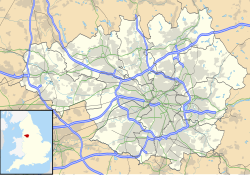| Barrow Bridge | |
|---|---|
 Cottages overlooking the Dean Brook | |
Location within Greater Manchester | |
| OS grid reference | SD685115 |
| • London | 224.4 mi (361.1 km) NW |
| Metropolitan borough | |
| Metropolitan county | |
| Region | |
| Country | England |
| Sovereign state | United Kingdom |
| Post town | BOLTON |
| Postcode district | BL1 |
| Dialling code | 01204 |
| Police | Greater Manchester |
| Fire | Greater Manchester |
| Ambulance | North West |
| UK Parliament | |
Barrow Bridge is a model village in the north-west outskirts of Bolton in Greater Manchester, England. It was created in the Industrial Revolution but since the demolition of the mills is now a residential village. [1]
